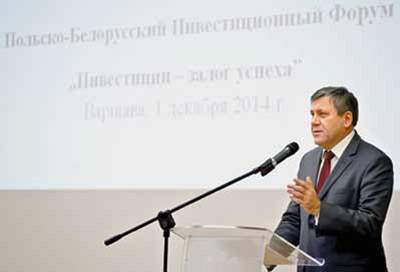
Deputy PM and Economy Minister Janusz Piechociński
during the Polish-Belarusian Investment Forum
According to Mr. Rusy, from 2009 to 2013, the volume of direct Polish investments attracted to Belarus rose 6.5-fold — from $27m to $178m. In 2013, Poland was ranked sixth in the list of countries investing in the Belarusian economy. Belarusian and Polish businesses are actively seeking new opportunities to work together. In 2014, the trade turnover of goods and services between Belarus and Poland is expected to exceed $3bn and is gradually approaching the pre-crisis level.
During the bilateral Investment Forum, Poland’s Deputy Prime Minister and Economy Minister Janusz Piechocinski said that Poland is ready to create new opportunities for oil and gas transit through Belarus. “We are in serious negotiations with those operators responsible for supplying natural gas and oil. I’m convinced that we can create new opportunities for the transit of Russian oil and gas via Belarus.” The Polish Deputy Prime Minister also noted that Belarus and Poland have good joint co-operation projects in manufacturing, the processing of fruit and vegetables, the establishment of joint ventures in the chemical industry, and the production of construction materials.
Moreover, Mr. Piechocinski drew attention to discussions about the development of transport corridors, which were an important part of the negotiations. He pointed out that the Swiss company Stadler had already invested in enterprise in Belarus. “I very much hope that the Polish company Pesa will become part of this sector as successfully as the Swiss,” said the Economy Minister. He is of the opinion that the Polish manufacturer produces high quality goods, including buses and trams.
In turn, the Deputy Chairman of the Polish Chamber of Commerce, Jerzy Drozdz, reinforced the view that Polish businessmen are keen to invest in Belarus. “Polish businessmen are interested in investing in Belarus. At present, the two countries are advancing towards a new stage of economic co-operation, shifting from direct trade to more complicated schemes,” he said. Mr. Drozdz explained that Polish businessmen prefer Belarus because of the two countries’ geographical, historical and cultural proximity, as well as personal contacts between residents of the two countries. According to the Deputy Chairman, the signing of the memorandum on co-operation between the National Agency on Investment and Privatisation of Belarus and the Polish Information and Foreign Investment Agency, will enable us to actively begin to collaborate on investment projects whilst also determining which areas are a priority.
The Director of the National Agency on Investment and Privatisation, Natalia Nikandrova, explained that Poland is interested in implementing projects in the spheres of alternative energy, transport logistics and agriculture in particular. “We invite Polish investors to Belarus. We’re working on the important legalities and are ready to create the legislation to suit definite investment projects, i.e. we’re ready to lobby the interests of investors in Belarus,” she underlined.
“The signing of such a document between the agencies will enable us to set up a single strategy and approach whilst also promoting the right conditions for doing business,” noted Belarus’ Deputy Prime Minister, Mikhail Rusy. He pointed out that both parties now need to work simultaneously on the preparation of professional staff and standardisation of goods. “We need to bring the Customs Union and the European Union closer,” stated Mr. Rusy, adding that business colleagues from Poland have requested that the Belarusians provide assistance in mastering the technical regulations of the Customs Union.
By Vladimir Khromov











